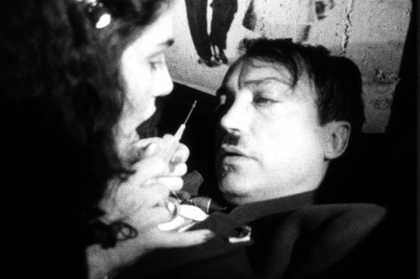
Christoph Schlingensief 100 Jahre Adolf Hitler 1989 AM12
100 Jahre Adolf Hitler – Die letzte Stunde im Führerbunker
(100 Years of Adolph Hitler – The Last Hour in the Führerbunker)
Christoph Schlingensief, 1989 Germany, 16 mm transferred to Blu-ray, 55 min
'By rooting the existence of Neo-Nazism in high society’s refusal to engage directly with the continued fascination with Hitler, and by subsequently making a film about fascism in the mode of a trash horror mockumentary, Schlingensief suggest that coming to terms with the past is not only a matter of politics, but a matter of taste as well.' (Tara Forrest and Anna Teresa Scheer, Christoph Schlingensief: Art Without Borders, 2010)
100 Years of Adolph Hitler is the first film in Schlingensief’s ‘Deutschlangtrilogie/German Trilogy’ 1989–92, which covers the period immediately prior to and post Germany’s reunification in 1989 and the country in the process of coming to terms with both and the past and present in post-war Germany. The films deal with the legacy of the Third Reich; the difficulties faced by Germany in dealing with its National Socialist past; the end of the 1968 revolutionary movement following the violent excesses of the Red Army Faction (RAF); and the many challenges posed by the post 1989 reunification period. Schlingensielf’s approach is direct – with the films explicitly revealing the hypocrisies, discriminatory practice and repressed violent tendencies that are masked by post-war Germany’s desired vision of itself as a post-fascist liberal democracy.
The last hour in the Führerbunker shows the key figures of the Nazi regime on the brink of its downfall fighting a private war of their own. Gorging, screwing, and machinating: the dark hallways of the Führerbunker are the location for all kinds of excesses. Shot in complete darkness in an original World War II bunker during a 16-hour period, the only light source is Schlingensief's flashlight guiding the camera through the controlled chaos; his cast acting to the point of exhaustion, the banality of evil is exposed in its integral obscenity. (Australian Cinémathèque)
Die 120 Tage von Bottrop – Der letzte neue deutsche Film
(The 120 Days of Bottrop – The Last New German Film)
Christoph Schlingensief, 1997 Germany, 16 mm transferred to Blu-ray, 60 min
'Schlingensief’s relationship with the New German Cinema has always been highly ambivalent. On the one hand, he recognises that it originated as a radical left-wing departure that unafraid of addressing specifically German concerns… The trouble with the New German Cinema, for Schlingensief, was that it soon lost its radical edge and developed a melancholic obsession with national guilt.' 'Reality in Egomania is cold and desolate and infused with an apocalyptic sense of futility and hopelessness – not unlike much West German culture of the mid-1980s.' (David Ashley Hughes, Reinventing the Left: Radical Responses to German Reunification, 2006)
The last survivors of Rainer Werner Fassbinder’s film crew gather to make the last New German Film: a remake of Pier Paolo Pasolini's notorious Salò or The 120 Days of Sodom 1975. Set in Berlin’s Potsdamer Platz (then the largest construction site in Europe), Schlingensief’s absurd homage and parody of the German cultural heritage is complete with appearances from figures from German film, TV and theatre scenes. Many actors, contributors and cultural icons appear as themselves, with some dead personalities resurrected for a final coup de grâce on New German Cinema. (Australian Cinémathèque)
See the full Tate Film programme.
